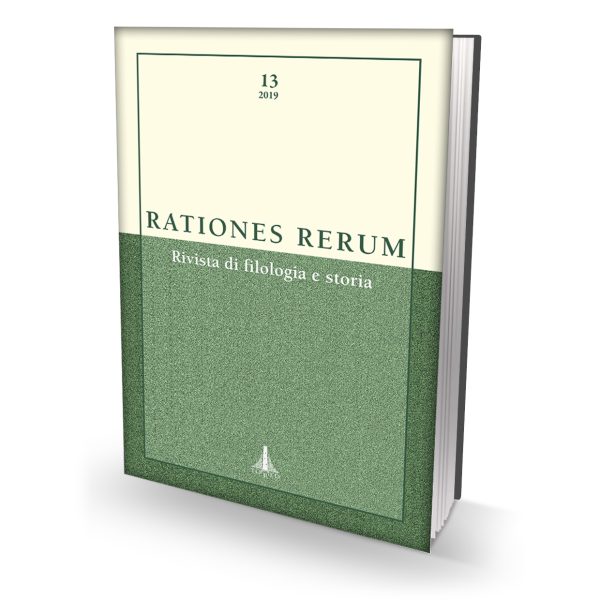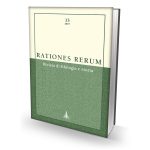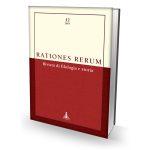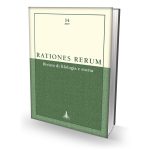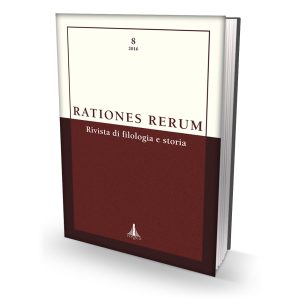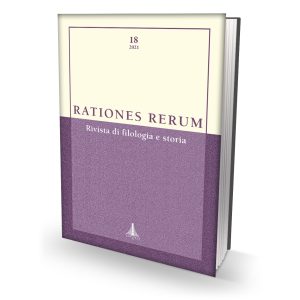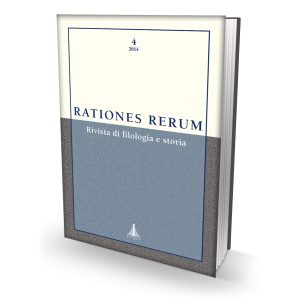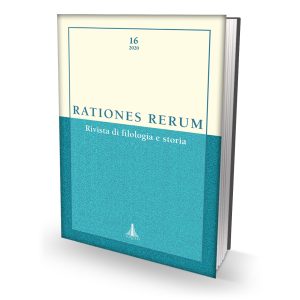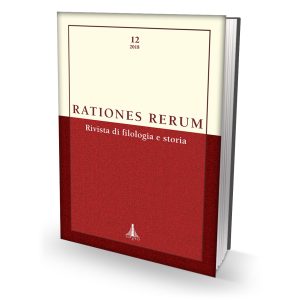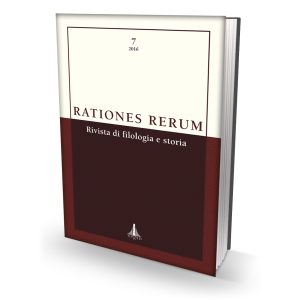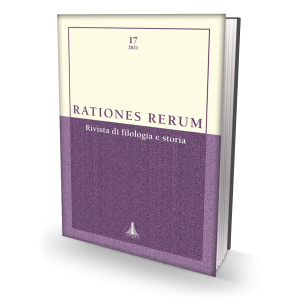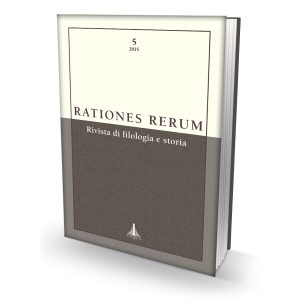RATIONES RERUM 13 – Rivista di filologia e storia
50,00 €
Autori vari
Anno edizione: 2019
Formato 17×24 – Pagine 312
Confezione a filo refe in brossura
Copertina a 2 colori con bandelle
ISBN 9788899846343 – ISSN 2284-2497
Prezzo: € 50,00
- Descrizione
- ANTEPRIMA
- ABSTRACTS
Descrizione
SOCIAL MOBILITY AS A CONSEQUENCE OF THE SPATIAL MOBILITY FROM SIXTH TO FOURTH-CENTURY GREECE
Sommario
Cinzia Bearzot, Migrant intellectuals in Classical Greece, p. 23
Francesco Mari, Singers on the move: travel and social mobility among the Greek rhapsodes and poets, p. 41
Alessandro Brambilla, Migrants, warfare, and social promotion in Classical Greece, p. 63
Laura Loddo, Self-imposed exile and opportunities for social promotion in Classical Athens: prospects for groups and individuals, p. 79
Livia De Martinis, From slaves to members of the liturgical class: the power of money, p. 111
Paolo A. Tuci, Spatial mobility and social promotion in the world of trade: Phanosthenes and Chaerephilus, two case-studies, p. 159
Studi e Ricerche
Maria Elena De Luna, Nota lessicale in margine al vocabolario dell’acculturazione: μιξέλλην, p. 199
Roberto Sammartano, La nozione di consanguineità nella Ἀρχαιολογία greca di Tucidide, p. 211
Giuseppe Squillace, Un’«estetica» dei profumi? Teofrasto e l’assenza di componenti agrumate nei profumi antichi, p. 231
Thomas R. Martin, Cutting down Paradise: The moral meaning of the change in the landscapes of Jerusalem in Josephus’ Jewish War, p. 251
Recensioni, p. 287
Libri ricevuti, p. 299
Abstracts, p. 303
Indice analitico (a cura di Carlo Di Giovine), p. 309
Istruzioni per gli autori, p. 311
Cinzia Bearzot
Migrant intellectuals in Classical Greece
pp. 23-39
This paper considers different categories of traveling intellectuals (logographers, rhetoricians, sophists and philosophers): “qualified migrants” who for educational or professional motives leave, more or less under no duress, their own city and their own environment and move around the world of the classical age that is culturally dominated by Athens. The goal is to investigate their expectations and the opportunities they encounter.
Francesco Mari
Singers on the move: travel and social mobility among the Greek rhapsodes and poets
pp. 41-61
This paper surveys the mobility of rhapsodes and poets in Archaic and early Classical Greece. It aims to assess the connections between such figures’ wanderings and their chance of achieving social promotion in terms of both renown and money. Although sparse and uncertain, our information about the lives of ancient Greek singers leaves little doubt regarding their internationalism. Most would travel for reasons not necessarily directly related to their activity as performers but that at least would offer opportunities to perform at symposia, courts, and festivals. Through their τέχνη, they could secure the glory of having patrons (including tyrants) or contribute to shaping a community’s identity. In exchange, some would ask for payment, and most would seek fame. The fame they won not only rivalled the fame of chariot-race victors but also endured far longer.
Alessandro Brambilla
Migrants, warfare, and social promotion in Classical Greece
pp. 63-77
Focusing almost exclusively on mercenary service, modern scholars often inadequately consider the relationship between spatial mobility and social promotion achieved by migrants through military careers in Classical Greece. Ancient sources, however, provide many examples of individuals or groups of migrants that, though not serving as mercenaries, were able to exploit their military experience to obtain social recognition in a new civic context.
Mercenary service undoubtedly represents an essential point of interest for any study on this topic. However, this was not the only option available for those leaving their country with a set of military skills at their disposal. These men either left their homeland of their own free will, induced by temporary circumstances, or were forced to do so by their own state. Such spatial movements were often the consequence of episodes of war or internal strife that directly involved these migrants and caused a worsening in their social status.
Through the analysis of the vicissitudes of some ancient migrants preserved by the sources, this paper aims to understand if those who left their native land trying to make a living out based on their own experience in war were always perceived as a potential threat, or could be also considered a useful resource worthy of a grant of privileges and even of citizenship. The examples provided conspicuously demonstrate how the host states were often ready to exploit these migrants’ competences for various war-related purposes, thus binding the grant of social recognition to public utility.
Laura Loddo
Self-imposed exile and opportunities for social promotion in Classical Athens: prospects for groups and individuals
pp. 79-110
Immigration as a factor of social mobility in classical Athens is a topic that has hitherto been underestimated. Athenian policies concerning the reception of political refugees call for reconsideration of this assumption. This paper aims to investigate the relation between the spatial mobility and the social mobility of those political refugees – individuals and groups – who chose Athens as a place of refuge. Political refugees were considered by the Athenians as “human capital” of which they could take advantage both in international relations and internal political debate: on the one hand, refugees who lost everything because of their support for Athens were publicly praised as benefactors of the Athenians in order to show gratitude towards loyal allies; on the other hand, the Athenian tendency to praise refugees’ contributions to the community in terms of their competences, occupational skills, and acts of generosity contributed to facilitating the integration of newcomers into the social structure of Athens.
Livia De Martinis
From slaves to members of the liturgical class: the power of money
pp. 111-158
In 4th century Athens several grants of citizenship were made to bankers of both humble and also foreign origins. To the well-known cases of Pasion (with his sons Apollodoros and Pasikles) and Phormio (with his sons Phormio and Archippos) can be added those of Sokrates, Sokles and his son Blepaios, Timodemos, epigenes, and Konon. Other individuals are merely listed as citizens, with no indication whether this status is due to birth or was granted by the Assembly. In all cases in which citizenship is granted, such grants appear to be due to the investment for the city of funds accumulated by the individuals in question, especially from banking activities. The fact that Athens was willing to grant citizenship to these people in a time, as was the case in the 4th century, of great economic difficulties, does not however mean that these citizens by decree were truly and deeply integrated; this can be seen especially in cases such as those of Apollodoros and Blepaios, who although they were second-generation citizens, were still striving for a life fully reflecting their civic status, not only in terms of the rights due them, but also in terms of lifestyle and political participation.
Paolo A. Tuci
Spatial mobility and social promotion in the world of trade: Phanosthenes and Chaerephilus, two case-studies
pp. 159-196
The aim of this paper is to ascertain both whether foreigners working in Athens in a sector of trade could achieve economic and social promotion and also what the feelings of Athenian citizens were towards them. Immigrants, after leaving their homeland voluntarily or being compelled to do so for any reason, resided in the city-state: here they could become metics, and they might also become interested in improving their social conditions in the new country in which they lived, even aspiring to achieve citizenship. The paper focuses on two case-studies, which present analogies and differences: that of Phanosthenes of Andros, who at the end of the 5th century B.C. was honoured for providing oars to the city, and that of the salted-fish seller Chaerephilus from sometime following the middle of the fourth century. For the former immigrant, the statuses of metic and then of citizen seem probable, while for the latter metic status is likely and the acquisition of the citizenship is certain. This paper attempts to reconstruct the experiences of these two foreigners, to understand whether they succeeded in acquiring economic and social promotion through their trade activity, and what their reception was in the Athenian community.
Maria Elena De Luna
Nota lessicale in margine al vocabolario dell’acculturazione: μιξέλλην
pp. 199-209
This paper offers, through both a historical and also a philological analysis, reflections on the interpretation of a fundamental term of the “vocabulary of acculturation”, μιξέλλην, seen in the light of some observations concerning its antonym μιξοβάρβαρος and the sporadic but significant cases in which these terms overlap semantically.
Roberto Sammartano
La nozione di consanguineità nella Ἀρχαιολογία greca di Tucidide
pp. 211-229
This study examines the passages of Thucydides’ Greek Ἀρχαιολογία (1, 2-19) in which references are made to the relationship between Greek ancestral lineages, in order to assess his opinion concerning the role played by the feeling of consanguinity in Greek archaic interstate relations. While the concept of συγγένεια played an important role in diplomacy at the time of the Peloponnesian War, in the age prior to the Greco-Persian wars the references to blood ties did not have – in Thucydides’ eyes – a significant impact on political relations between Greek communities. This does not mean that in the archaic age συγγένεια was not considered a moral value, or that it was only an invention of 5th century rhetoric. Rather, Thucydides’ investigation of the most important historical events of the archaic age led him to note that factors of aggregation and/or conflict between the various lineages of the Greek world responded, from the beginning, to different logics than those of an appeal to postulated ties of kinship.
Giuseppe Squillace
Un’«estetica» dei profumi? Teofrasto e l’assenza di componenti agrumate nei profumi antichi
pp. 231-249
Theophrastus when dealing with the composition of ancient perfumes in his De odoribus does not mention citrus fruits among their ingredients. This absence continues also in later sources –Pliny the elder and dioscorides – who in discussing the theme of perfumes employ the writings of peripatetic philosophers together with information from other sources. Nevertheless, Theophrastus, Pliny, and dioscorides knew citrus fruits well and emphasized and appreciated their fragrance, which was exploited above all in preparations for medical use. Greeks’ not using citrus fruits in making perfumes should perhaps be linked to the bitterness that forms part of the fruits’ appealing aroma. This characteristic conflicted with the “idea of perfume” that Greeks had elaborated since the archaic era, which made sweetness the main characteristic of a pleasant fragrance.
Thomas R. Martin
Cutting down Paradise: The moral meaning of the change in the landscapes of Jerusalem in Josephus’ Jewish War
pp. 251-285
For Josephus in Book 6 of his Jewish War, landscape visualizes the change from good to evil that frames his history of the Roman siege of Jerusalem and destruction of the Temple in 70 CE. Inside the city, the landscape has metamorphosed from a built environment nurturing human life into a dystopia strewn with piles of corpses. outside Jerusalem’s walls, the formerly sylvan landscape has been so deforested to provide wood for the Roman’s siege works that it has become literally unrecognizable, now a desert instead of a lush paradise.
Josephus equates this transformation in Jerusalem’s landscape with the Jewish rebels’ mutation from pious followers of God’s law to violent perpetrators of impiety. God therefore allows Jerusalem to be consumed by the flames of Roman ferocity. Josephus’ language evokes parallels to both the story of the paradise of eden in Genesis and also the story of the spring of Elisha in II Kings. Through these connections, Josephus focalizes landscape in Book 6 as a mirror of human destiny as he relates the climax of the catastrophe that changed the world by confirming for Christians that God had installed them as his chosen people in place of the Jews.

